glimpses of my life and thoughts
On the banks of the Nile 1953-1958
The School
In 1953 Wadi Seidna was one of four state boys’ secondary schools covering the whole of this vast country. One of these was in the South, and there was only one secondary school for girls. Entry requirements were tough and the pupils highly motivated, many of them going on to university and ending up filling high positions in the professions, the government or the army. Most were Northerners.
Apart from Arabic the medium of instruction was English, and the students sat the Cambridge School Certificate, their papers sent on to the UK for marking.
The staff were more or less equally divided between Sudanese, Egyptian and British. The Sudanese headmaster did a good job keeping us together, even during the Suez crisis of 1956 when anti-British sentiments in the country rose to fever pitch.
I can recollect no occasion of student misbehaviour. But when there was a strike the whole school was closed and the boys dismissed. On their return all of them were caned. It became an annual routine each November.
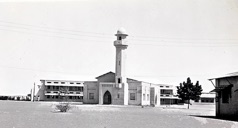
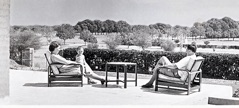
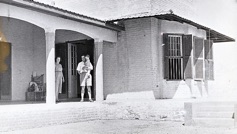

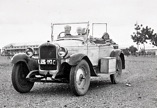
Above is Michael, a most kind and affable man with an wry sense of humour, with his family in their car, the school just visible in the distance on the left. Returning a few years later to England, he was unable to cope with teaching there. Becoming mentally unstable he shot his wife and his three children before killing himself.
On arrival I was given my timetable and had to start teaching at 7 o’clock the following morning. Feeling somewhat apprehensive with no foreknowledge of the syllabus, I was both relieved and astonished to find not only that the school used the very same textbook as at Haberdashers’ but that in my first lesson the pupils had just started learning about circle geometry and were covering precisely the same pages that I had been teaching barely three days before in England. Bizarre. The only problem was my hilarious attempts at pronouncing their Arabic names.
A month later Anne joined me with our year-old son Keith, and so began a most happy and relaxed 5 years on the banks of the Nile. Among our many pleasures was sleeping outside on dark nights under the canopy of a host of stars.


By 1958 it was time to move to a less isolated environment with access to schools and other facilities. So I was pleased to accept an offer to teach mathematics to older students at Khartoum Technical Institute.
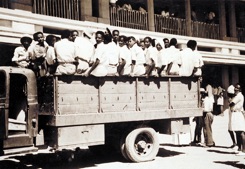
The view across the sandy expanse from the back of our house, the mosque in the foreground and the school behind. We were awoken at dawn each morning by the resident Muezzin calling people to prayer.
From our balcony at the front we looked upon well-irrigated trees and lawns, the Nile a short distance beyond.
We lived in a spacious bungalow provided by the Sudan Government at nominal rent and enjoyed running water and electricity.The loo sported an earth closet with a trap door to the outside; the waste was collected late each night by men with a camel-driven tank.
One of several lorries that ferried the boys to and from Khartoum on a Friday. Staff without a car would join them.

our 1953 Morris Oxford.
Politics
Since 1898 the Sudan had been a con-dominion jointly run by Britain and Egypt with the former talking a leading role, the Arabic-speaking and Muslim North and the largely English-speaking and Christian South being administered separately. The Sudan was not a colony in the same sense as Kenya or The Congo, and no foreigners were allowed to own property or land, although the style of administration was in many ways similar.
In 1943 The British decided that the North and South should be fully integrated into a single government, and there followed over half a century of war and bloodshed until 2011 when following elections the South became independent.
Since 1956, when the Sudan as a whole became independent, there have been several changes of the government based in Khartoum, including military coups d’état.
The students at Wadi Seidna used to get quite excited about politics, and you could guarantee that at least once a year they would strike and march around the campus shouting slogans such as “Down with the British!”. “We don’t mean you, Sir, or any of the British staff”, one boy reassuringly explained as we nervously watched the noisy procession pass by our house.
Social and family life
My teaching commitment was about half the full timetable and even less when I became head of the maths department. All written work was expected to be marked and returned by the following day, and this could be done in school time which ended at 2pm. So after a siesta there was ample time for other activities: entertaining and enjoying the company of our two sons either on our own or with the families of neighbours; playing tennis and swimming on site, strolling down to the Nile; Squash in Khartoum; partying (especially at Christmas); coping with insects, scorpions and snakes; playing bridge and poker; processing photographs in the kitchen or bathroom using ice to keep the chemicals cool (not to warm them up as in the UK!). We Brits kept much to ourselves in this closed and isolated community but on occasion we invited Sudanese colleagues: a cushy life, with servants to do most of the chores — though Anne cooked our meals then. However for three years I spent quite some time running the school athletics, marking out the arenas and organising matches against the other two secondary schools in the north.

Sailing up the Nile to Juba

Another unforgettable experience was driving a lorry along rough tracks in the bush and camping overnight in torrential rain, with a team of workers and servants attending to our various needs. At our first night stop, miles from any habitation in the middle of a flooded track, pitch dark with lorries stuck in the mud, I was astonished to find my temporary boss in his tent dressed for the evening meal sporting a starched white shirt, bow tie and cummerbund drinking whisky and soda. “In these parts”, he warned me (I was in khaki shorts and short sleeves),”If you don’t dress for dinner you go mad”. I thought he was mad already.
Q. How do you get hot water for a bath when there’s no boiler?
A. By painting black the outsides of empty paraffin cans, filling them with water and leaving them to heat up in the sun.

Simon at 6 months
Brotherly love — not necessarily all the time!



